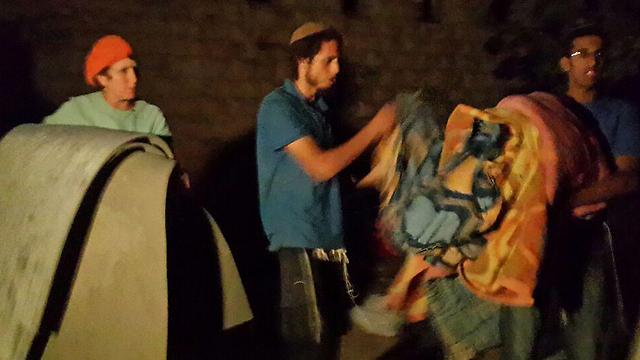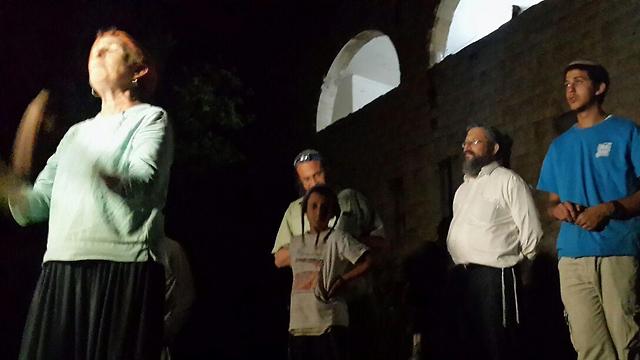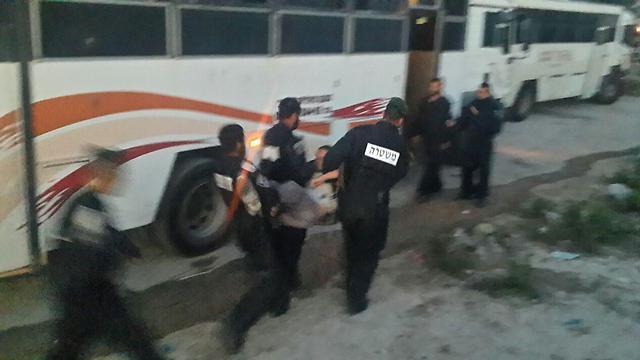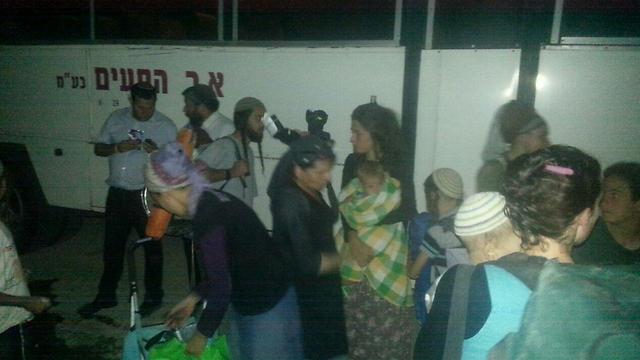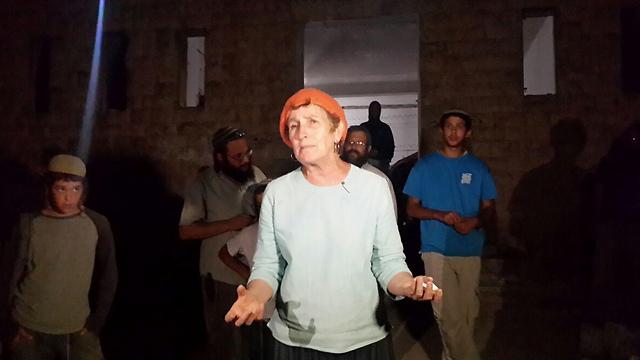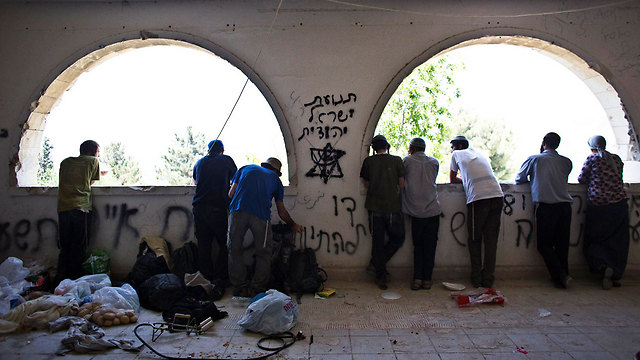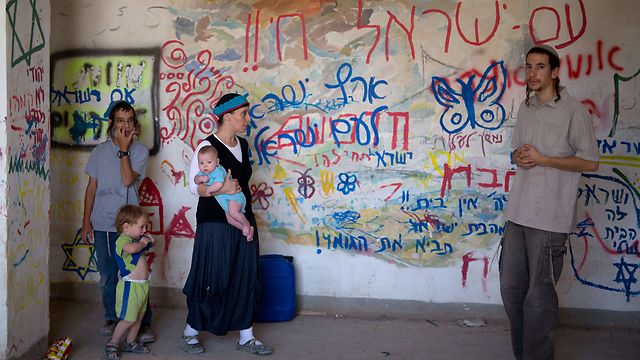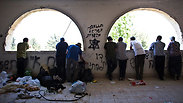
Army and police on Thursday night entered the fortress in the ruins of the village of Sa-Nur, where some 250 people had arrived Monday night without approval from Israeli security forces, ten years after the West Bank settlement was evacuated. The families who had barricaded themselves inside left the site without resistance at around 3am.
About one hundred young people initially refused to leave, but were evacuated after a few hours. The area was declared a closed military zone, buses were brought to take the families away, and barriers were placed at the entrance to the former settlement. The evacuation was ultimately completed at around 7am.
According to the families, troops used pepper spray on them. "Relatives who stayed at the scene and even small children were hit and violently dragged to buses and truck buses brought by security forces," the families said in a statement. The families and most of the teens were taken to the settlement of Kedumim.
One border police officer announced to the others that two fellow officers had refused orders to force the evacuation. He asked the officers to speak to their soldiers about the severity of this. According to the families, border police officers who refused orders were removed from the scene by their colleagues.
Yossi Dagan, the acting chief of Shomron Regional Council, said after the evacuation that he would work to annul the disengagement in the West Bank and reestablish Sa-Nur and Homesh.
"We are working with the backing of Knesset members and the Knesset chairman to cancel the disengagement law in the Samaria settlements. I am convinced that in the coming year we will be able to achieve progress," he said. "There is no reason for us not to correct this mistake, ten years after the disengagement." Dagan added that the prime minister had promised to meet with the families who were removed in the coming days.
"You arrive in Sa-Nur and you see roads, behind me there are flowers, trees, sidewalks," Dagan said. "The only thing missing is people. There was no logic to this expulsion and I hope to receive authorization from the prime minister to build Homesh and Sa-Nur in an official and organized manner."
The council head explained why the removal of the families transpired peacefully, without violence or resistance. "Knowing the families, these are responsible people who love Israel and love the IDF. No one has any interest in confronting the security forces. Despite the anger and outrage that they sent the army and the police back 10 years after the uprooting and explusion from Gush Katif, no one acted in a violent manner. The families here explained to me very clearly that for them the issue here is not to fight the security forces but to return to the displaced communities and rebuild them and I was very happy to hear this."
Shosh Shiloh, who was among those removed from the scene, said: "Tel Aviv, Kfar Shmaryahu and Kfar Saba exist thanks to our ancestors who lived here and thanks to God who promised us this land as an inheritance." She explained that the families who came to Sa-Nur are not "usurpers or tree-cutters". Sheila turned to the soldiers and warned them of the next evacuation. "I'm informing you that the commanders who will come after you, will have to deal with what you are dealing with and I suggest you prepare them so that they know that here there are people who love the land of Israel, and that they should get enough sleep before coming to us because it's not easy to deal with us."
The standoff at Sa-Nur was something of a denouement to a stormy week – on Wednesday, the government tore down two controversial housing structures known as the Draynoff buildings in the West Bank settlement of Beit El after nearly two days of violence between settlers and police at the scene.
The families who returned to Sa-Nur this week decided on Wednesday to send a letter to Prime Minister Netanyahu, in which they pleaded with him: "Please spare us, our children, and the entire people of Israel, the unnecessary sights of destruction and eviction."
The settlers were also concerned with the fact security forces closed off all access to the area, raising the fear they would have to stay in the settlement for days without food or water in the rising summer temperatures.
"A decade ago we were banished from Sa-Nur and the settlements of the northern Samaria, and with God's will we returned home two days ago," the settlers wrote. "Our stay here over the past two days proves that it is possible (to return)."
Netanyahu declined to respond, but he did make another decision that was certain to satisfy many settlers. The Prime Minister's Office announced that it was green lighting the construction of 296 housing units in Beit El. The prime minister also approved hundreds of housing units in Jerusalem neighborhoods beyond the Green Line, including the construction and marketing of 91 housing units and the planning of 24 homes in Pisgat Ze'ev, as well as the planning of 300 housing units in Ramot, 70 in Gilo and 19 in Har Homa.
The housing units that were approved on Wednesday were promised by the Israeli government three years ago following the evacuation of the Givat Ulpana neighborhood in the settlement and have been waiting for official approval since.
The Palestinian Authority condemned the decision to build the new homes. The European Union also condemned the decision and urged Israel to reverse the decision, saying "the recent decisions of the Israeli authorities to further advance settlement expansion in the West Bank and East Jerusalem call into question the Israeli government's stated commitment to a negotiated two-state solution in the Middle East Peace Process."
Mark Toner, deputy spokesperson of the US Department of State, also criticized the move. "We are deeply concerned about the Israeli government’s announcement today of the advancement of nearly 300 new housing units in the West Bank settlement of Beit El, as well as hundreds of new housing units in East Jerusalem," Toner said in a statement.
"The United States continues to view settlements as illegitimate and we strongly oppose steps to advance construction in the West Bank and East Jerusalem. Settlement expansion threatens the two-state solution and calls into question Israel’s commitment to a negotiated resolution to the conflict. We continue to urge the Israeli government to refrain from unhelpful actions that undercut the possibility of a two-state solution."













